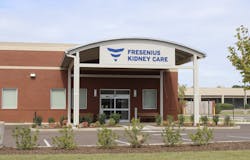Aetna, Fresenius Enhance Value-Based Care Agreement Around ESRD
Aetna, a CVS Health company, and Fresenius Medical Care North America (FMCNA) have announced they have enhanced their value-based care agreement to support Aetna Medicare Advantage members with end-stage renal disease (ESRD).
FMCNA provides support services that focus on the full continuum of care for approximately 4,500 Aetna ESRD members, with the end goal of reducing hospitalizations and improved patient outcomes. According to officials, the enhanced value-based agreement includes additional incentives that align healthcare reimbursement with quality performance and reduction of total cost of care to deliver greater value to Aetna Medicare Advantage members.
Quality performance measures in this arrangement support Aetna with the Centers for Medicare & Medicaid Services (CMS) Star Ratings initiative, with measures of quality of health and drug services. The companies say they are also developing unique ESRD performance metrics tied to CMS quality measures for this population. Aetna Medicare Advantage members with ESRD will continue to have access to FMCNA’s more than 2,600 dialysis centers and home dialysis options, officials stated.
The value-based care agreement was effective Jan. 1, 2021, and this agreement also aligns with the 21st Century Cures Act, which opens the door for previously ineligible ESRD patients to enroll in a Medicare Advantage plan beginning in January. This has been considered by many industry groups as a welcomed change, as while most Medicare beneficiaries have an array of coverage options, individuals with kidney failure have historically faced fewer choices and potentially large out-of-pocket costs due to the expensive nature of kidney dialysis.
According to the CMS, more than 430,000 Medicare fee-for-service ESRD beneficiaries spend an average of 12 hours a week receiving dialysis at a center. The federal agency’s Kidney Care Choices (KCC) alternative payment model is structured to encourage participating practices to delay the onset of dialysis and instead focus on transplants. However, CMS recently decided to push the start date back for this program until 2022.
More than 785,000 Americans are living with kidney failure, with more than 554,000 relying on life-sustaining dialysis. Treatment can be challenging and costly for both patients and payers. “Kidney disease affects millions of people and requires personalized treatment options that are right for them,” Angie Meoli, senior vice president, network strategy and provider experience at Aetna, said in a statement. “Aetna and FMCNA have had a longstanding relationship, collaborating to help Aetna Medicare Advantage members with ESRD receive the care needed to live healthy and productive lives. Value-based arrangements, like we’ve established with FMCNA, will continue to be essential for supporting chronic care patients with quality, affordable care when they need it most.”
Last fall, FMCNA announced the expansion of a similar collaboration with health insurer Humana, with the goal to expand specialized care coordination services for Humana members with chronic kidney disease (CKD) from three states to 39 throughout this year.
“Aetna has been a great partner in our mutual goal to improve the quality of care and outcomes for our patients while reducing total costs to the health care system,” said David Pollack, president of FMCNA’s Integrated Care Group. “Together with our physician partners in InterWell Health, a national network of high-performing nephrologists focused on value-based care, we are confident we can build upon the success reached over the past six years to positively impact the lives of patients living with kidney disease.”


